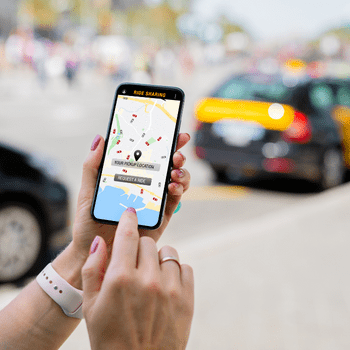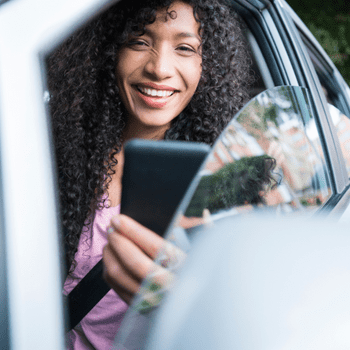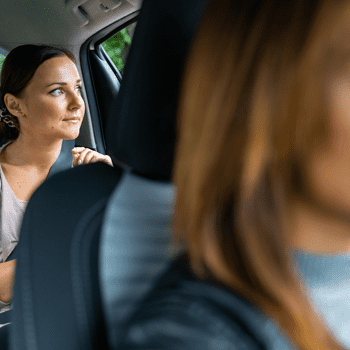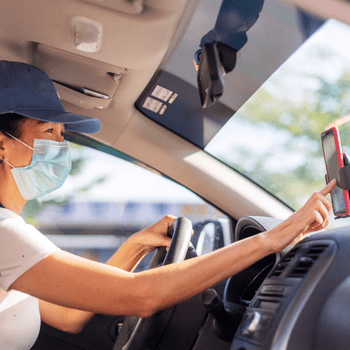Duluth, GA Uber & Lyft Accident Attorney
Skilled Rideshare Accident Lawyers In Duluth, Georgia
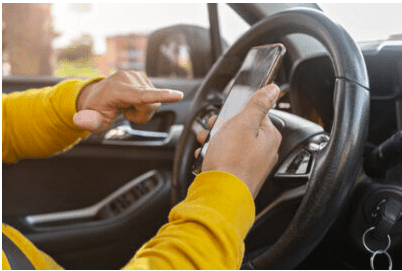
Companies that provide ridesharing services promote themselves as neighborly conveniences. Riders may enjoy friendly transport to their destinations—whether directly to the airport, out on the town, or home for the night—while drivers can earn additional money on their schedule. Unfortunately, accidents can happen at no fault to you. If you are involved in a car accident while riding in an Uber or Lyft, our Duluth Uber accident lawyer at Scholle Law is here to help.

Ridesharing Apps In Georgia
No one can drive a vehicle on the road for hire in the state unless they have a for-hire license endorsement or a private background check, according to Motor Vehicles and Traffic Law 40-5-39. Drivers must also have liability insurance coverage in the amounts allowed by law for the type of vehicle they are operating.
The law applies to limo drivers, ridesharing companies, and taxi services. The driver must meet the following requirements to get a for-hire endorsement, according to Motor Vehicles and Traffic 40-5-39:
- You must be at least 18 years old.
- Have a valid Georgia driver’s license that isn’t restricted
- Must not have been convicted of a felony, “moral turpitude” offense, or a series of misdemeanors demonstrating a “pattern of disregard” for the law.
- Fingerprints were sent to the Georgia Crime Information Center for a background check.
- Be a U.S. citizen or provide federal paperwork that has been validated by Homeland Security as legitimate proof of legal status in the United States.
- The endorsement is valid for the same amount of time as the person’s driver’s license and is subject to a criminal background check to ensure eligibility.
- If a rideshare platform’s private background check fulfills the state’s criteria, drivers can operate for-hire cars without the aforementioned endorsement.
What Should I Do If I Have An Uber Or Lyft Accident In Georgia?
Getting involved in a car accident of any kind is a terrifying experience. A car collision involving an Uber or Lyft is no exception. If you’ve been in an Uber or Lyft accident, here are some pointers to assist you to navigate the next steps:
- Seek medical help right away. It is critical to look after your health. If you are harmed or suspect you have been injured, dial 911 or go to the nearest medical hospital right once.
- Call the police. Any accident resulting in bodily harm or property damage should be reported to the authorities.
- Make a list. Following a stressful encounter, it’s normal to forget important information regarding the accident. Make a list of details concerning the collision, such as the junction, time of day, and road conditions.
- Take pictures. Photographic proof of car damage and any injuries, as well as any highway evidence, such as skid marks, can aid prove a case.
- Nothing should be signed. You are not required to agree with or communicate with any corporate representative without first seeking legal advice, nor are you required to make any public statements or admit blame. Make contact with an experienced rideshare accident attorney.
Taking Legal Action Against Uber Or Lyft
It may be required to launch a lawsuit against the ridesharing business if the insurance coverage is insufficient, the insurance company fails to pay, or the ridesharing firm acts recklessly. By designating drivers as independent contractors, Uber and Lyft try to shield themselves from liabilities. The actions of an employee are significantly more likely to be held legally liable than the actions of an independent contractor.
Passengers in an Uber or Lyft ridesharing car, as well as those in another vehicle involved in an accident caused by a rideshare driver, will most likely be restricted to the businesses’ liability or uninsured motorist coverage.
When it comes to ridesharing incidents, Georgia law has upheld the independent contractor argument, insulating ridesharing corporations like Uber and Lyft from direct liability. Those harmed in a rideshare vehicle may have a claim against the driver and the driver’s insurance, including rideshare providers’ commercial and UIM insurance. The ridesharing businesses, on the other hand, are frequently protected by the independent contractor defense.
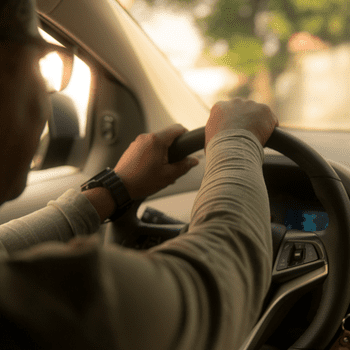
Should I Talk To The Rideshare’s Insurance Company If They Call Me?
It is important to note that speaking with an insurance company can sometimes place you at risk of compromising your rights or hurting your chances of obtaining a fair settlement from a lawsuit. For this reason, it is critical to consult with an experienced attorney before deciding whether or not to have any kind of contact with a rideshare insurer. An attorney can help you navigate this complex situation and work towards securing the best possible outcome in your case.
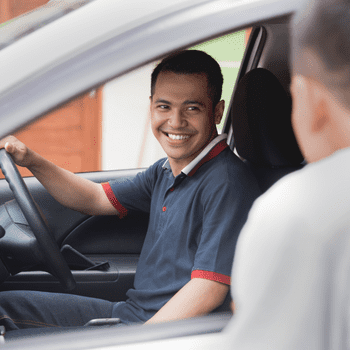
Who is responsible for compensation after an Uber or Lyft motor vehicle accident?
When you get into an Uber or Lyft, you expect to reach your destination safely and without incident. Unfortunately, car accidents can happen, whether due to the negligence of another driver or simply bad luck. In these situations, questions often arise about who is responsible for compensating injured passengers, both in terms of medical expenses and lost wages from time off work.
In general, the drivers of Uber and Lyft vehicles are responsible for their own actions on the road, including any accidents. However, it is important to note that many ride-sharing companies have what is known as a “contingent liability policy,” which may be used to pay certain claims related to an accident if the driver was not at fault. Therefore, in the event of an Uber or Lyft car accident, it is critical to investigate all possible sources of compensation. This could involve seeking damages from both the driver’s insurance company and the ride-sharing company itself and help you with your medical bills, lost wages and any pain and suffering caused by the rideshare vehicle accident . Ultimately, it will depend on the specific situation and circumstances surrounding each particular case as to who will ultimately be held responsible for paying compensation after an Uber or Lyft accident.
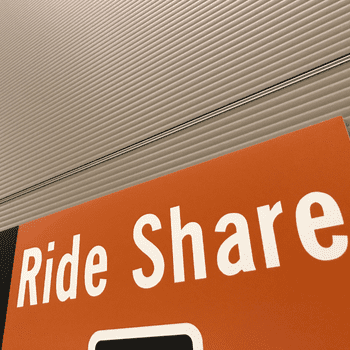
3 Rideshare Scenarios To Consider When Evaluating A Uber Or Lyft Car Accident
As with all auto accidents, every Rideshare accident is different and how to proceed depends on the circumstances of the incident. It’s important for rideshare car accident injury victims to understand the following types of driver statuses as they can significantly effect the outcome of your case.

Rideshare driver has accepted a ride request
When a rideshare driver accepts a ride request and gets behind the wheel, they take on a serious responsibility to keep their passengers safe and protected. On the one hand, this means driving carefully and avoiding distracted or aggressive behaviors that could put others at risk. At the same time, however, passengers also have an important role to play when it comes to safety on rideshare vehicles. By staying alert, refraining from spilling drinks or leaving belongings unattended, and following protocol for reporting issues or emergencies, riders can do their part to keep everyone safe in rideshare vehicles.
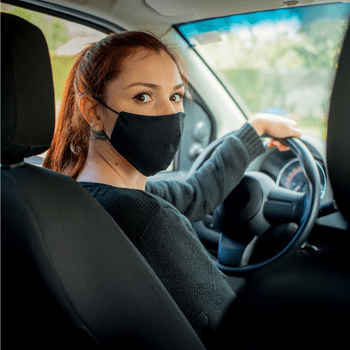
Driver is logged into Uber or Lyft, but hasn’t accepted a ride
If a driver is logged into the Uber or Lyft app, but hasn’t yet accepted any passengers, he or she may still be held liable depending on when the accident occurred during this time period. This is because drivers are still considered part of the overall rideshare system at this stage, and as such need to abide by all relevant safety regulations and traffic laws. Furthermore, in some cases, even if a driver has accepted passengers in the past and was therefore already considered part of the rideshare system in that moment, they may still be held liable for a car accident that occurred while they were actively on their ride. This can happen when their current driving behavior falls short of what it should have been had they properly evaluated the situation before accepting a passenger. Ultimately, determining liability in a rideshare accident requires taking all relevant details into account and evaluating each situation on a case-by-case basis.
Driver is logged out of Uber
When it comes to rideshare accident liability, the issue is often a murky one. This is especially true when the driver involved in an incident has previously been logged out of their app. In these situations, it can be difficult to determine who is at fault and whether they are liable.
At the heart of the matter is the question of what constitutes a ride. Legally speaking, a driver is considered to be driving for hire whenever they have their app open and ready to receive passenger requests. However, some drivers may choose to log out during periods when they are not actively looking for fares or simply waiting for something to happen. Depending on how much time has elapsed during that period, these drivers might find themselves on shaky ground in terms of liability if an accident occurs.
On one hand, if a driver has been logged out for more than a few minutes and hasn’t received any passenger requests during that time, it could be argued that there was no ride taking place at the time of the accident. Therefore, the rideshare company would likely not be liable under such circumstances. On the other hand, if a driver was immediately available when an incident occurred but hadn’t accepted any fare requests before then, it could be argued that they should still be considered as having been available for hire at that point. As such, they could potentially face some financial liability in such instances.
Ultimately, determining liability in rideshare car accident cases involving logged out drivers can be something of a gray area and will depend heavily on the specific circumstances surrounding each individual case. At best, this type of situation highlights just how tricky some aspects of rideshare services can ultimately be from both a legal and technological perspective.
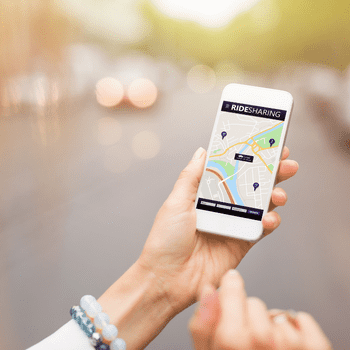
Most Common Type Of Duluth Rideshare Accident Injuries
- Soft tissue injuries
One of the most common types of injuries sustained in rideshare accidents is soft tissue damage. This can include injuries to the muscles, ligaments, and tendons.
- Broken bones
Another common type of injury sustained is a broken bone. Rideshare vehicles are often involved in high-speed collisions, which can result in serious fractures.
- Head injuries
Head injuries are also common in rideshare accident occurs. Due to the nature of rideshare vehicles (i.e., they are often driven by strangers), passengers are at a higher risk of sustaining a head injury in an accident. Head injuries can range from concussions to skull fractures and can be life-threatening.
- Neck injuries
Neck injuries are also common in rideshare auto accidents, particularly whiplash. Whiplash is a type of neck injury that occurs when the head is suddenly jerked forward or backward, causing the neck muscles and ligaments to stretch beyond their normal range of motion.
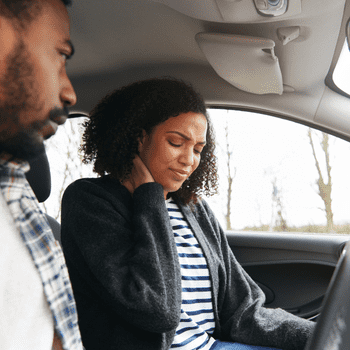
- Back injuries
Back injuries are also common in a rideshare motor vehicle accident. These types of injuries can range from mild to severe, and may require surgery to correct.
- Internal bleeding
Internal bleeding is another common type of injury sustained in Uber and Lyft accidents. This occurs when blood vessels are ruptured and blood leaks into the body cavity.
No matter what your injuries are as a result of a rideshare vehicle accident, seek medical attention first. Then speak with a Uber & Lyft rideshare accident lawyer, they’ll be able to help you file a personal injury claim against the at fault party, help you with medical bills, property damage and make sure you receive all the compensation you are entitled to for your pain and suffering.
Georgia Rideshare Accident Statistics
The year 2020 marks an important milestone for Georgia, as it marks the tenth anniversary of rideshare programs like Uber and Lyft. In these ten years, hundreds of thousands of Georgians have benefitted from these convenient transportation options. But with increased usage comes increased risk, and this milestone has also brought a significant rise in the number of rideshare accident statistics.
From August 2020 to August 2022, there were a total of over 4,000 rideshare vehicle accidents in Georgia. These accidents ranged from minor fender-benders to more serious collisions that resulted in injuries or fatalities.
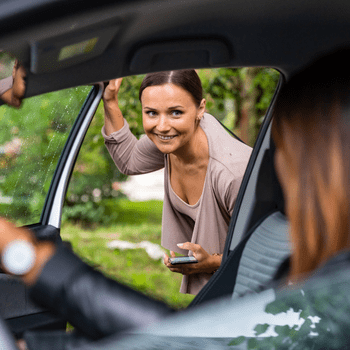
How Can Uninsured Motorist Coverage Effect My Rideshare Accident Claim?
In a rideshare accident, it’s especially important to understand how UM coverage can affect your claim. For instance, since rideshare drivers typically rely on their own personal insurance rather than commercial policies, they may have limited UM coverage. This means that it’s essential to carefully review and understand your own policy so you know exactly where you stand if you’re involved in an accident while logged into a ridesharing app.
Additionally, it’s important to seek out the counsel and advice of an experienced personal injury lawyer who can help navigate any challenges and ensure that you are fairly compensated for your losses. Overall, understanding the role of UM coverage in rideshare accidents is critical for ensuring that your rights and interests are fully protected.
Contact A Duluth GA Uber Accident Lawyer Today
If you’ve been hurt in a ridesharing accident, you’ll need a Uber & Lyft rideshare accident lawyer who knows how to fight auto insurance companies for the best possible result. Scholle Law can help. Contact our Duluth rideshare accident attorney today.

